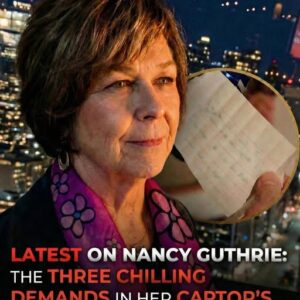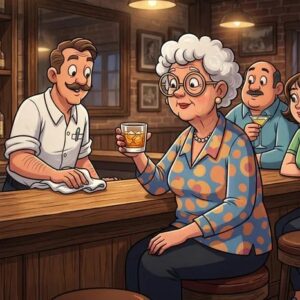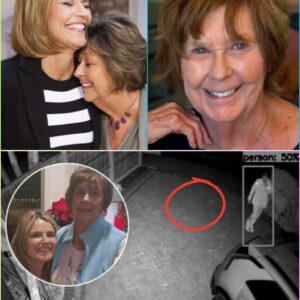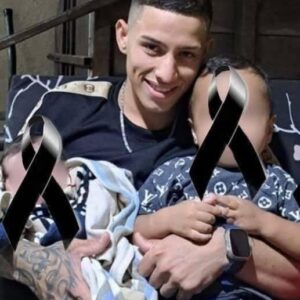Bikers threaten a teen, unaware who he really was, they instantly regret itOn a cool, golden Saturday evening in Fairfield, Connecticut, families gathered in the local park. The air smelled of fresh-cut grass, and the chatter of parents, coaches, and kids drifted over the soccer fields. Laughter echoed as Jordan’s team played their final match of the season, cheered on by a crowd wrapped in scarves and warm jackets.
Under a tall oak tree near the edge of the field, sixteen-year-old Michael sat reading a worn hardcover book. He was hard to miss—dressed not in soccer gear or a hoodie like the other teens, but in a crisp black suit, his hair neatly combed. He looked out of place, yet perfectly composed. It was his quiet way of honoring his mother’s rule about presence: always show up as your best self.
He glanced at the field every so often, watching Jordan, his younger brother, dart between defenders. Michael was proud of him, always had been. Soccer wasn’t his thing, but supporting Jordan? That was non-negotiable.
Suddenly, the serene setting shifted.
The low rumble of engines broke through the hum of the game. Five motorcyclists pulled into the parking lot, kicking up dust. Their bikes gleamed under the fading sun, and their leather jackets bore patches no one in town recognized. Heads turned. Parents squinted in their direction. Most assumed they were just passing through.
But Michael felt it—something cold prickling at the back of his neck. His mother always said, “Don’t be afraid when fear shows up. Stand where you are.”
He watched as the bikers slowly scanned the park. Their eyes slid over families, then paused—locking onto him.
The leader, a large man with a shaved head and weathered skin, stepped off his bike and approached, flanked by two others. Their walk was slow, deliberate, as if they were already in control. Michael closed his book and stood up, his posture calm, his eyes steady.
“Kid,” the leader barked, “what are you doing here dressed like that?”
Michael didn’t flinch. “Waiting for my brother to finish his game.”
The man gave a twisted smile. “Doesn’t really look like your kind of place.”
Michael’s hands remained at his sides. “This is a public park.”
The bikers closed in, circling him in a false show of casual curiosity. Their voices lowered. One brushed against his shoulder. Another leaned closer than necessary.
Michael’s training kicked in—not just the years of karate, but the discipline his mother taught him: Don’t react. Respond. His breath slowed. He stayed grounded.
“I don’t want trouble,” he said clearly. “Just here for my brother.”
But the tension tightened. One of the bikers muttered something under his breath, and the leader took a step forward.
Then, a small but fierce voice rang out: “Go away from him!”
It was Jordan, sweaty and breathless, running off the field. A few parents turned, unsure of what was unfolding.
The bikers turned their attention to him. Michael moved instantly, placing himself between his brother and the threat.
“Go stand with the coach,” he said softly to Jordan. But Jordan didn’t budge.
The leader laughed and lunged, clearly aiming to shove or intimidate. But Michael moved first—fluid, fast, focused. In a blink, he deflected the man’s hand, stepping aside with precision and landing a controlled strike that sent him stumbling.
The others reacted, but Michael stayed calm. Every motion was calculated: a step back, a block, a sweep. Within moments, he had dismantled each biker’s attack, using their momentum against them. It wasn’t showy. It wasn’t violent. It was clean, technical self-defense.
Spectators froze. The soccer match had stopped. Phones were out. No one had expected the quiet boy under the tree to become the center of such a scene.
Michael stood firm, facing the last man still upright. “Enough,” he said, his voice even. “I don’t want to hurt you.”
The leader wiped blood from his mouth. “This isn’t over.”
Michael didn’t respond. The bikers limped back to their motorcycles, engines roaring as they sped away.
Jordan ran to him. “How did you do that?”
Michael exhaled slowly, the adrenaline fading. “It’s not about size. It’s about preparation.”
That night, after explaining everything to their mother, Michael lay in bed, staring at the ceiling. His muscles ached, but his mind was clear. He wasn’t proud of the fight. He didn’t want it. But he knew he had protected what mattered.
His mother came in briefly, checked on him, then simply said, “You did well. Quiet strength. Just like your grandfather.”
Later, as sleep came, Michael realized something powerful: real courage isn’t about noise, confrontation, or proving something. It’s about control—of the mind, the body, the heart.
His story wasn’t one of violence. It was about standing tall with grace. And about knowing exactly when to rise—not with fists, but with discipline.
And that made all the difference.





